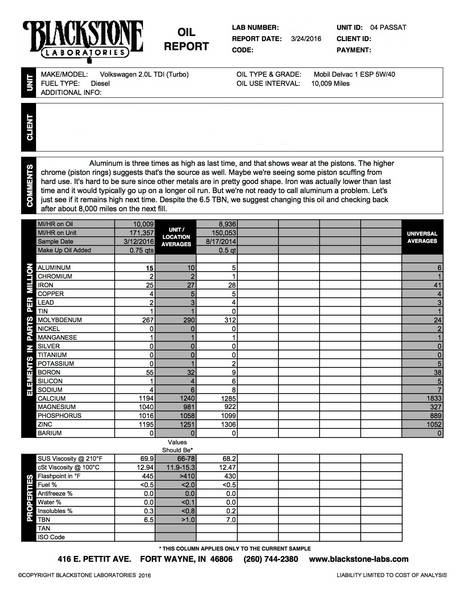Here is my second analysis on my 2004 Passat TDI Wagon. Unfortunately there is the unexpected result of the relatively high aluminum measurement, otherwise everything else is fine for longer OCI (I have not changed the oil yet). When I first put this oil in June 2015 I also added approximately seven ounces (210 ml) of Liqui Moly MoS2 (Molybdenum based). Based on previous VOA Mobil Delvac 1 does not contain any moly (reference this site).
Some background on my drive dynamics: my daily commute is a less than six mile drive to work, all city with speed limits up to 45 MPH. The rest of my driving consists of interurban highway and family road trips in the Texas autobahn going 70-80 MPH. My Passat Wagon TDI has a manual transmission (five speed) so whenever I can I drive in fifth gear to maximize efficiency. When I drive the car in the highway (family road trips) and when the opportunity presents while the engine is warmed up I do the 'Italian tune up' and I frequently redline the engine in this process (at least once a week or more if I can). I can say that in the last year or so I have made an effort to drive the car harder (redline it) on a more or less regular basis to avoid any carbon/soot build up and making sure that the turbo vanes are working well. Could this explain the higher aluminum numbers due to rapid acceleration and redlines (resulting in piston scuffing)?
Another data point which might be or not pertinent to the high aluminum number. In the last three months I started to develop a boost leak which now I have fixed (90 degree hose connecting the upper intercooler to the EGR).
Thanks in advance for any feedback you may have on this UOA.

Some background on my drive dynamics: my daily commute is a less than six mile drive to work, all city with speed limits up to 45 MPH. The rest of my driving consists of interurban highway and family road trips in the Texas autobahn going 70-80 MPH. My Passat Wagon TDI has a manual transmission (five speed) so whenever I can I drive in fifth gear to maximize efficiency. When I drive the car in the highway (family road trips) and when the opportunity presents while the engine is warmed up I do the 'Italian tune up' and I frequently redline the engine in this process (at least once a week or more if I can). I can say that in the last year or so I have made an effort to drive the car harder (redline it) on a more or less regular basis to avoid any carbon/soot build up and making sure that the turbo vanes are working well. Could this explain the higher aluminum numbers due to rapid acceleration and redlines (resulting in piston scuffing)?
Another data point which might be or not pertinent to the high aluminum number. In the last three months I started to develop a boost leak which now I have fixed (90 degree hose connecting the upper intercooler to the EGR).
Thanks in advance for any feedback you may have on this UOA.


